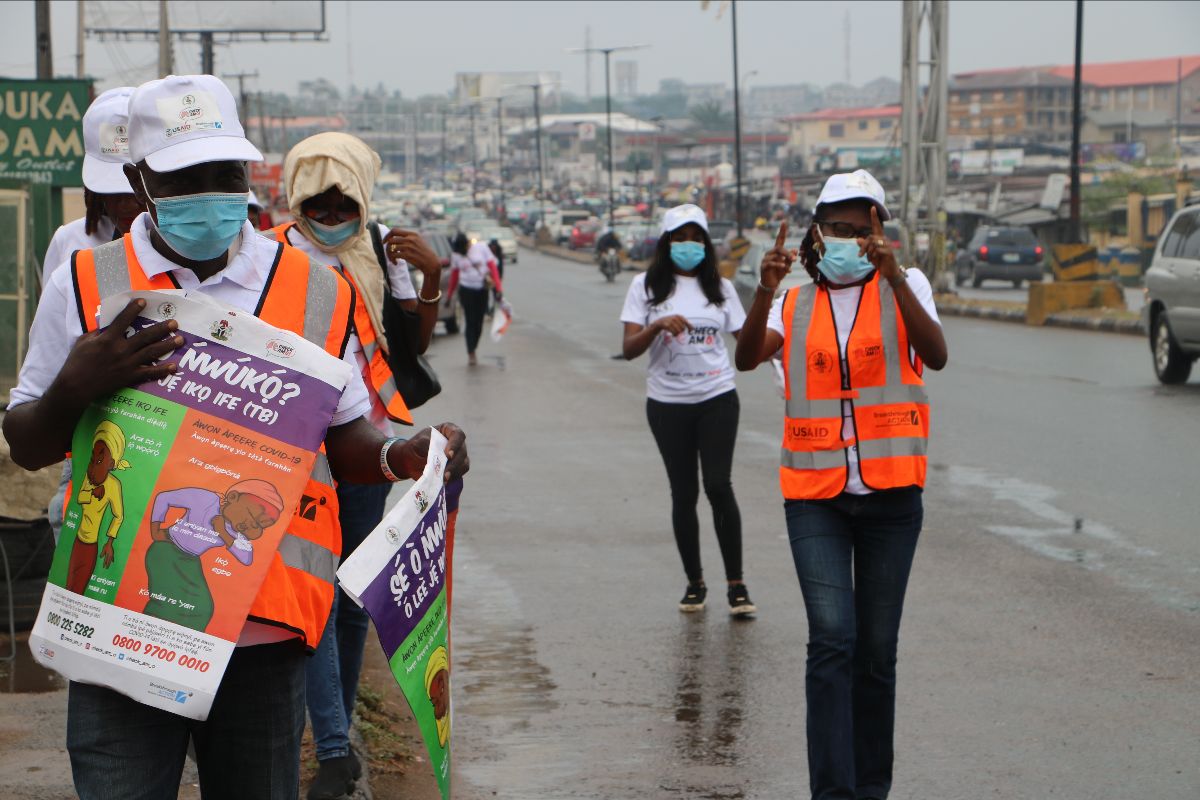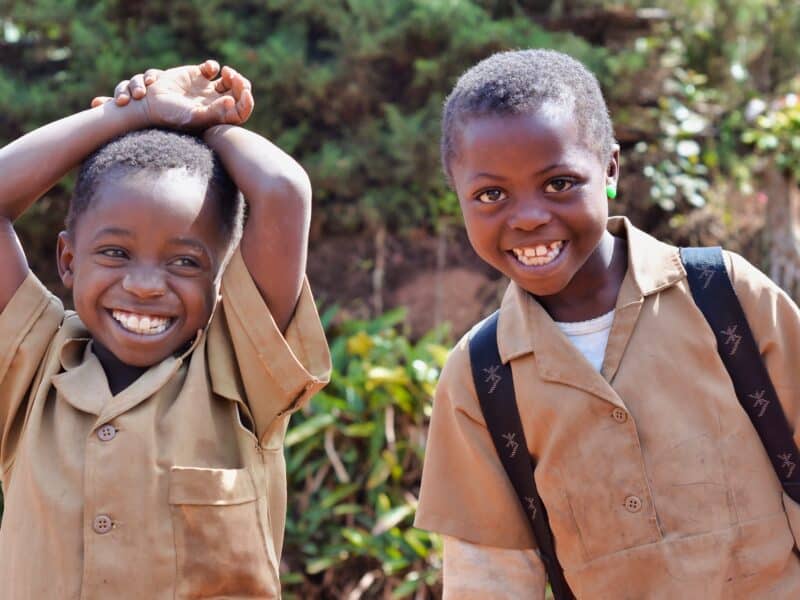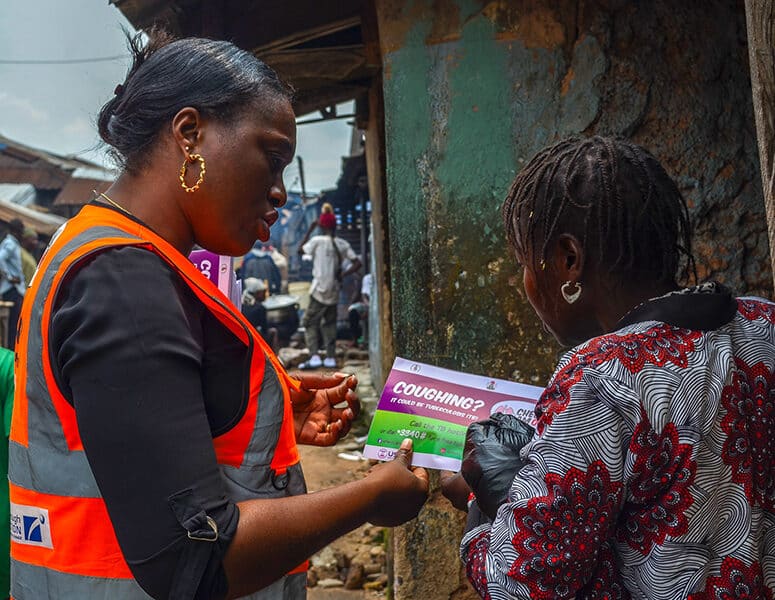Nigeria’s first social and behavior change tuberculosis campaign increased the demand for TB services by nearly ten-fold, paving a path for other countries where COVID-19 has reduced the number of people seeking medical care, new research suggests.
CCP’s Breakthrough ACTION-Nigeria project worked alongside the National TB and Leprosy Control Program and other TB stakeholders in the country to develop a national tuberculosis campaign that targeted Nigerians who had a cough lasting longer than two weeks. Campaign radio spots, animated television and social media videos, posters, stickers, brochures and a provider job aid encouraged sick Nigerians to call a toll-free national TB hotline. Operators would help callers distinguish between TB and COVID-19 symptoms and ultimately send those with likely TB symptoms to get tested for it.
Results from the Check Am O! campaign, which ran between December 2020 and March 2021, will be presented at the virtual American Society of Tropical Medicine and Hygiene annual meeting on Sunday, Nov. 21 at 8:30 a.m. The successful campaign is unique because of its focus on behavioral aspects of tuberculosis – like whether people go to a health facility for a cough test – rather than only on getting people treatment once they are diagnosed.
“We realized that just because we’ve invested so heavily in making sure [TB] services were available, it didn’t mean that people would demand those services,” says Debby Nongo, USAID activity manager for Breakthrough ACTION. To make sure that the campaign would reach the right people with the right messages, Breakthrough ACTION conducted a human-centered design process to ensure that a wide variety of stakeholders had input.
According to the World Health Organization, even before the pandemic Nigeria had one of the lowest TB detection rates in the world. But the pandemic and lockdowns further restricted clients’ ability to go to health facilities for testing and treatment. Similarities between TB and COVID-19 symptoms delayed access to care as patients were screened for COVID-19 before considering TB and stigma around TB kept people from getting treated. But delays in TB treatment can increase transmission of the highly contagious diseases that kills 1.5 million people each year.
“With the COVID-19 pandemic, people were scared to go to the facilities,” says Bolatito Aiyenigba, MBBS, MPH, Breakthrough ACTION-Nigeria’s deputy project director for malaria and tuberculosis, who will present the results Sunday. “We had to design the [Check Am O!] campaign so that it speaks to both COVID-19 and TB – and makes it clear that not everyone who is coughing has COVID. It could be TB or it could be something else. The campaign allows people to be comfortable that they are able to attend the facility and get tested for TB.”
Data from an April 2021 survey showed that 71 percent of adults had been exposed to one of the more than 13,600 radio spots or nearly 3,000 television spots aired during the campaign. While the National TB Hotline received more than 22,000 calls in the October to December 2020 quarter – before the campaign began – during the January to March 2021 quarter, it received more than 209,000 calls, a nearly ten-fold increase. As more spots aired, the number of calls to the hotline increased.
The call center manager, Bukola Osinubi, has been with the center since 2015. “We now get more calls from people who want to check whether the hotline is truly functional, and we get to refer more people for TB testing including those who call on behalf of others,” she says.
The annual ASTMH meeting, held entirely online from November 17 to 21, brings together the latest scientific advances in tropical medicine, hygiene, and global health. Registration for this year’s virtual event can be found here. Findings from Breakthrough ACTION and other CCP projects will be presented during poster sessions throughout the meeting and include:
- Malaria Care-seeking and Treatment Ideation among Gold Miners in Guyana
- Addressing COVID-19 rumors and behaviors using theory in Guyana
- Effect of Social and Behaviour Change Interventions on Malaria Health Behaviour -LLIN use and treatment seeking in Ethiopia
- The relationship between COVID-19 and perceived access to malaria care in Uganda
- Estimating population ITN access at the council level using stock & flow models
- Effects of Coronavirus pandemic on Health Seeking Behaviors of Young Adults in Uganda
- KAP COVID Case Study: Masks, Beliefs, and Vaccine Acceptance – Global Dissemination of COVID Behaviors
- Assessment of the bed net retail market across six sites in Tanzania
- Use of a mobile phone survey to estimate regional bed net access in Tanzania
- Human-centered design process and solutions to promote malaria testing and treatment-seeking behavior in Guyana hinterlands
- Advancing Evidence for the Global Implementation of Spatial Repellents (AEGIS)





